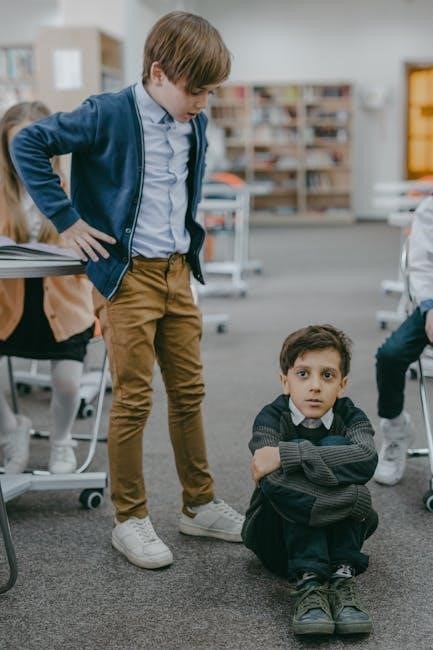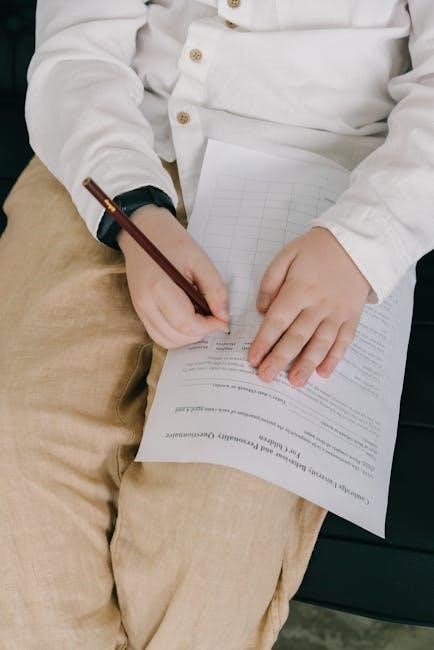Conflict resolution skills are essential for managing disputes effectively‚ ensuring peaceful solutions‚ and maintaining strong personal and professional relationships. These skills involve active listening‚ emotional awareness‚ and impartiality‚ enabling individuals to address conflicts constructively and foster understanding.

1.1 Definition and Importance of Conflict Resolution
Conflict resolution refers to the process of addressing and managing disputes to reach a peaceful and mutually acceptable solution. It involves effective communication‚ empathy‚ and problem-solving to resolve disagreements constructively. The importance of conflict resolution lies in its ability to maintain harmony‚ strengthen relationships‚ and prevent escalation of disputes. In personal and professional settings‚ resolving conflicts fosters collaboration‚ trust‚ and respect. It also enhances decision-making and promotes a positive environment. Developing these skills is crucial for individuals and organizations to navigate challenges efficiently and sustain growth. Conflict resolution is not just about resolving issues but also about understanding diverse perspectives and fostering understanding.
1.2 Key Skills Required for Effective Conflict Resolution
Effective conflict resolution requires a combination of interpersonal and cognitive skills. Key skills include staying calm under pressure‚ seeking common ground‚ and demonstrating adaptability. The ability to remain impartial and approach conflicts with objectivity is crucial. Strong problem-solving skills enable individuals to identify creative solutions. Additionally‚ adaptability allows for adjusting strategies based on the situation. A collaborative mindset fosters mutual understanding and cooperation. These skills collectively empower individuals to navigate conflicts constructively‚ ensuring positive outcomes and strengthened relationships. Developing these abilities is essential for resolving disputes efficiently and maintaining harmony in both personal and professional environments.

Key Skills for Conflict Resolution
Mastering emotional awareness‚ active listening‚ and nonverbal communication are vital for effective conflict resolution‚ enabling individuals to navigate disputes with empathy and clarity.
2.1 Emotional Awareness and Management
Emotional awareness is crucial in conflict resolution as it allows individuals to recognize and manage their emotions‚ preventing escalation. By staying calm and focused‚ one can address issues objectively‚ ensuring constructive dialogue. This skill also helps in understanding others’ emotions‚ fostering empathy and cooperation. Effective emotional management enables parties to communicate respectfully‚ even in tense situations‚ leading to mutually beneficial solutions. Developing this skill involves self-reflection and practice‚ ultimately enhancing one’s ability to navigate conflicts with clarity and composure. It is a cornerstone of successful conflict resolution‚ promoting understanding and collaboration.
2.2 Active Listening and Paraphrasing
Active listening and paraphrasing are vital skills in conflict resolution‚ ensuring that all parties feel heard and understood. By attentively listening to others‚ individuals can grasp their perspectives and respond thoughtfully. Paraphrasing involves summarizing the speaker’s message to confirm understanding‚ which helps clarify expectations and prevent miscommunication. This approach fosters a collaborative environment‚ reducing defensiveness and promoting openness. Effective active listening also involves maintaining eye contact and avoiding interruptions‚ signaling respect and genuine interest. These practices build trust and facilitate constructive dialogue‚ making it easier to reach resolutions that satisfy all parties involved. They are essential for effective communication in conflict situations.

2.3 Nonverbal Communication Skills
Nonverbal communication plays a crucial role in conflict resolution‚ as it conveys emotions and intentions beyond words. Facial expressions‚ body language‚ and eye contact can either escalate or diffuse tension. Open postures‚ such as uncrossed arms‚ signal receptiveness‚ while crossed arms may indicate defensiveness. Maintaining appropriate eye contact shows attentiveness and sincerity without intimidating others. Similarly‚ gestures and tone of voice can influence how messages are perceived. Being aware of nonverbal cues helps in managing one’s own reactions and interpreting others’ emotions accurately. This awareness fosters empathy and understanding‚ enabling more effective conflict resolution. Mastering nonverbal communication enhances overall communication clarity and conflict management effectiveness.

Conflict Resolution Techniques
Conflict resolution techniques include mediation‚ negotiation‚ and assertive communication. These methods foster understanding and collaboration‚ helping parties reach peaceful solutions. Ensuring clarity and mutual respect.
3.1 Mediation and Negotiation Strategies
Mediation involves a neutral third party facilitating dialogue to resolve disputes‚ while negotiation strategies focus on finding mutually beneficial solutions. Both approaches emphasize active listening‚ clarity‚ and respect. Effective mediators remain impartial‚ guiding discussions toward win-win outcomes. Negotiation requires flexibility and creative problem-solving to address differing perspectives. These strategies help maintain relationships by fostering understanding and cooperation‚ ensuring all parties feel heard and valued. Successful mediation and negotiation rely on strong communication skills and the ability to manage emotions‚ leading to sustainable resolutions and strengthened trust among individuals or groups. These techniques are essential in both personal and professional conflict scenarios.
3.2 Assertive Communication and Compromise
Assertive communication involves expressing needs clearly and respectfully without aggression or passivity. It ensures both parties feel heard and valued‚ fostering a constructive environment for conflict resolution. Compromise is a key strategy‚ requiring flexibility and willingness to find middle ground. By balancing assertiveness with empathy‚ individuals can navigate disagreements effectively. Compromise doesn’t mean sacrifice but rather a collaborative effort to meet mutual needs. This approach strengthens trust and respect‚ leading to sustainable solutions. Effective use of assertive communication and compromise enhances relationships and resolves conflicts amicably‚ ensuring all parties feel satisfied with the outcome.
3.3 Problem-Solving and Decision-Making
Effective problem-solving and decision-making are critical in conflict resolution‚ enabling individuals to identify and address root causes of disputes. This involves analyzing issues‚ generating creative solutions‚ and evaluating their potential outcomes. Collaboration is key‚ as it ensures all parties contribute to the decision-making process. By fostering a solution-oriented approach‚ conflicts can be transformed into opportunities for growth. Problem-solving skills‚ such as critical thinking and resourcefulness‚ help navigate complex situations. Decision-making should be fair‚ transparent‚ and considerate of all perspectives. When applied effectively‚ these skills lead to mutually beneficial solutions‚ strengthening relationships and promoting long-term harmony.
The Role of Conflict Resolution in Relationships
Conflict resolution strengthens personal and professional relationships by fostering trust‚ collaboration‚ and mutual understanding. It ensures disputes are addressed constructively‚ preserving harmony and promoting lasting connections.
4.1 Maintaining Personal and Professional Relationships
Effective conflict resolution is vital for maintaining healthy personal and professional relationships. By addressing disputes constructively‚ individuals can foster trust‚ respect‚ and open communication. This ensures that relationships grow stronger‚ even during challenging times. In personal relationships‚ resolving conflicts peacefully prevents resentment and strengthens emotional bonds. In professional settings‚ it promotes collaboration‚ teamwork‚ and a positive work environment. By learning conflict resolution skills‚ individuals can navigate disagreements in a way that respects everyone’s needs‚ leading to lasting harmony and mutual understanding in all aspects of life. This approach ensures relationships remain resilient and thrive despite conflicts.
4.2 Building Trust and Respect in Conflict Situations
Building trust and respect is crucial during conflict resolution‚ as it fosters a positive environment for open communication. By remaining calm‚ empathetic‚ and fair‚ individuals can establish mutual respect‚ even in tense situations. Trust grows when actions align with words‚ and both parties feel heard and valued. Active listening and nonverbal cues‚ such as maintaining eye contact and open body language‚ reinforce sincerity. Respecting differing perspectives encourages collaboration and reduces defensiveness. Over time‚ these practices strengthen relationships and create a foundation for resolving future conflicts amicably. Trust and respect are the cornerstones of lasting harmony in both personal and professional interactions.
Training and Development in Conflict Resolution
Training programs in conflict resolution‚ such as experiential learning and community mediation‚ equip individuals with essential skills and techniques to manage disputes effectively and foster collaboration.
5.1 Experiential Learning Activities and Exercises
Experiential learning activities engage participants in real-life conflict scenarios‚ helping them develop practical skills. These exercises focus on addressing personality differences‚ perceptions‚ and communication styles. Through role-playing and group discussions‚ individuals learn to navigate disputes effectively‚ fostering collaboration and understanding. Such interactive approaches encourage active participation‚ allowing learners to apply conflict resolution techniques in realistic settings. This hands-on method enhances retention and prepares individuals to manage conflicts with confidence in both personal and professional environments. By simulating actual challenges‚ experiential learning equips participants with the tools needed to resolve conflicts constructively and maintain harmonious relationships.
5.2 Community Mediation and Dispute Resolution Programs
Community mediation programs provide structured approaches to resolve disputes within neighborhoods and organizations. These initiatives focus on teaching negotiation and mediation techniques‚ empowering individuals to address conflicts collaboratively. By training participants in effective communication and problem-solving‚ such programs foster mutual understanding and respect. They often include workshops and practical exercises‚ enabling individuals to apply their skills in real-life situations. The goal of these programs is to create a supportive environment where conflicts are resolved peacefully‚ promoting harmony and strengthening community bonds. Through active engagement‚ participants learn to manage disagreements constructively‚ leading to lasting resolutions and positive relationships.



